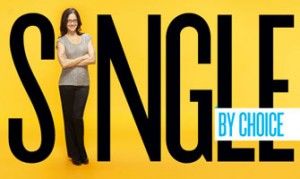Please Define 'Single'

In my January cover story, “Single By Choice,” I set out to profile the new breed of singles that are happy — and thriving — in their lives without a partner. The data was all there: The numbers from the 2010 Census show that nearly half of the American population is now single and researchers have learned that they’re living healthier, more active lives than many of their married counterparts. But when I began to report this piece, I immediately realized that being single — and happy about it — was a complicated thing to define.
In an early attempt to find interview subjects, I sent out a tweet asking to connect with Bostonians who were happily single. I got responses from all kinds of lovely folks, most of whom were young and enjoying all that the dating world had to offer: “You have the freedom to go out and look for the right person to spend time with, or the unchained ability to focus on your own goals and aspirations,” wrote Chris Mathison, a 30-year-old web developer in Boston who’s enjoying his independence so much, in fact, that he and a friend created the website That’s Why I Dumped You (presumably for the very recently single). Others said they relished the freedom of their current single status, but couldn’t wait to shack up with someone down the road. It wasn’t exactly what I was looking for.
So I met up with Michelle Cove, the Brookline-based director of the documentary, “Seeking Happily Ever After” and the author of a recently published book of the same name. One of hardest parts about being single is just using the word, she told me. When she set out to talk to people about being single, she found that the bulk of the people she spoke with weren’t sure exactly how and when to identify themselves as such. “People are like, ‘Well, am I single? What does that mean? Is it if I have a boyfriend but I’m not married? Is it if I have no interest in dating whatsoever?’ It really encompasses too much.”
Cove’s book isn’t a typical mating manual, and it’s novel in that it categorizes different subsets of singles, creating a sort of species within the greater genus. She provides insight on finding fulfillment for everyone from the Late Bloomers, who have been putting their lives on hold while waiting for their wedding, to the Trailblazers who are disinterested in marriage and willing to carve out a “new path toward happiness.” It was these Trailblazers that I grew most interested in. The ones for whom singlehood wasn’t happenstance, but a conscious decision. Once I knew how to define them, the challenge became finding them. But I’ll write more about that in another post…
How do you define single? Join the conversation on Twitter using the #idont hashtag. And follow us @BostonMagazine for more updates on this story.


